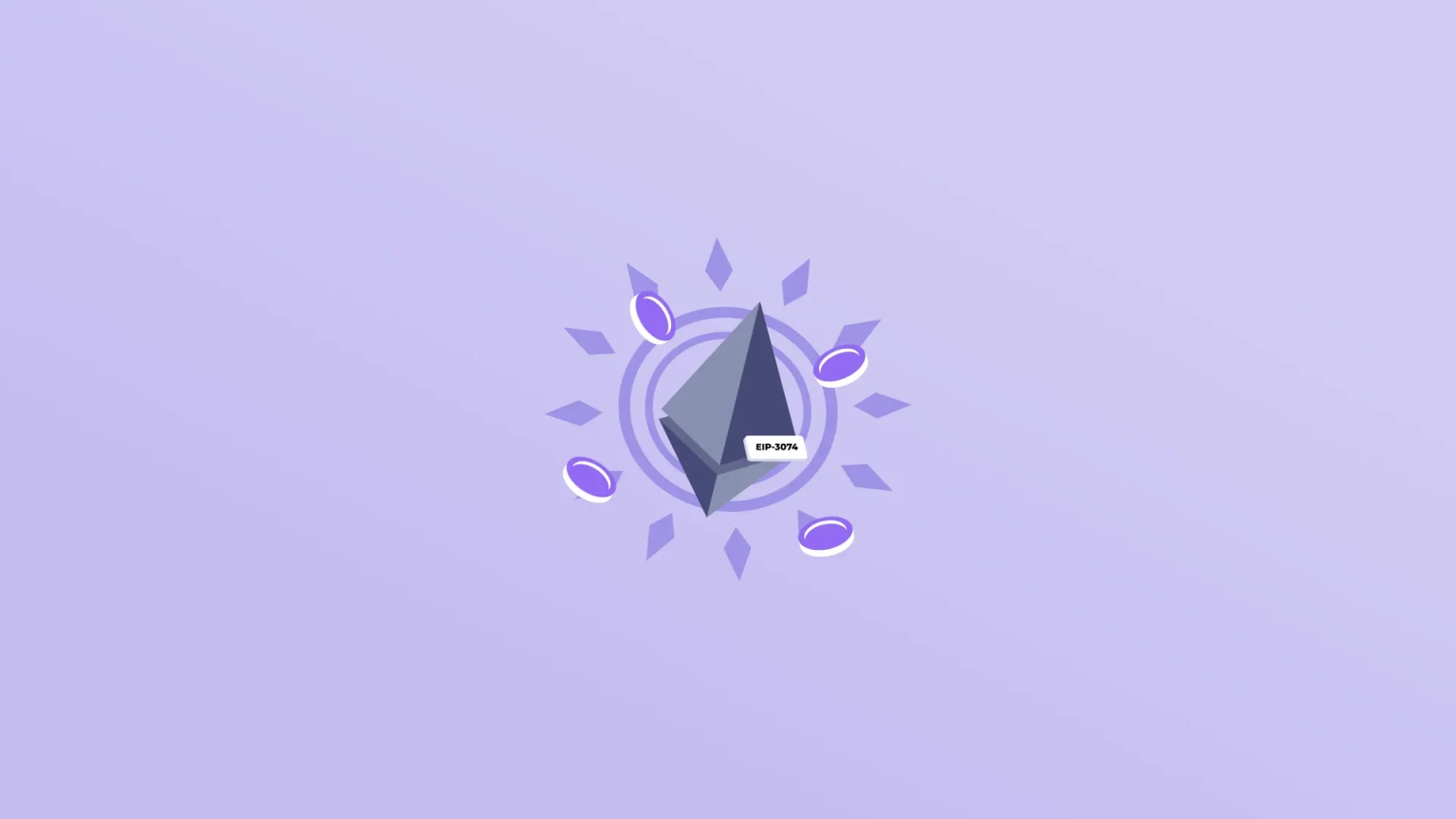
Collaboration between Neptune Mutual and SushiSwap
Explore Neptune Mutual's ongoing collaboration with SushiSwap offering several benefits.
Youtube Video
Playing the video that you've selected below in an iframe

A deep dive into EIP-3074, an Ethereum proposal that enables sponsored transactions
Ethereum, while a pioneering force in blockchain technology, presents several challenges that can deter users—particularly novices—from fully engaging with its ecosystem. In response to these obstacles, continuous developments are aimed at enhancing the user experience, making Ethereum more accessible and user-friendly.
One such initiative is Ethereum Improvement Proposal 3074 (EIP-3074), which introduces features such as gas sponsorship and streamlined interactions with decentralized applications (dApps). These improvements bear a resemblance to account abstraction, particularly in facilitating transactions where others can cover the gas fees on behalf of the user. But, how are they different?
In this blog, we will delve into EIP-3074, exploring how it echoes the principles of account abstraction, the benefits it brings to the Ethereum community, and the challenges it faces in implementation.
EIP-3074 is an Ethereum Improvement Proposal designed to streamline and enhance the functionality of Externally Owned Accounts (EOAs) by allowing more sophisticated operations. To access features like gas sponsorship or social recovery, users might have had to transition to using Smart Contract Wallets (SCWs). It can be cumbersome and introduce a layer of complexity for both users and developers.
EIP-3074 allows users to maintain their EOAs while accessing functionalities that were previously only possible through SCWs. The proposal introduces two new operations within the Ethereum Virtual Machine (EVM): AUTH and AUTHCALL.
An EOA can authorize an invoker, a smart contract that performs advanced functions on its behalf, through the AUTH operation. A signed message that specifies the desired actions and parameters achieves this authorization. Once an EOA has authorized an invoker, the AUTHCALL operation allows this invoker to execute transactions as if the EOA itself were conducting them. This setup simplifies the user's interaction with blockchain technology and also enhances security and accessibility.
For instance, EIP-3074's gas sponsorship allows users to conduct transactions without having to pay gas fees. Approved third parties cover these costs, increasing Ethereum's accessibility, particularly for new users.
Account abstraction has innovated how users interact with blockchain technology. It aims to take away the traditional approach in which individuals use externally owned accounts (EOAs) to interact with blockchain. With account abstraction, a smart contract acts as the primary interface for a user's interactions with other contracts.
In simple terms, account abstraction lets you program Ethereum accounts and abstracts away from the technicalities associated with EOAs, making users’ interactions with blockchain flexible and intuitive.
With the introduction of EIP-3074, the same features are achieved without the technicalities and complexities associated with account abstraction. However, it’s important to understand that sponsoring gas fees is one of the many features of account abstraction.
There have been discussions online about whether EIP-3074 is a threat to account abstraction. However, it’s highly unlikely that account abstraction will be replaced, considering its features and potential. Rather, EIP-3074 serves as an innovation that could complement account abstraction.
EIP-3074 introduces several benefits that significantly enhance the Ethereum user experience. One of the most notable improvements is the simplification of interactions with decentralized applications (dApps). With EIP-3074, users are no longer required to maintain their own balance of ETH, specifically for gas fees. This change means that engaging with dApps becomes more straightforward, as users do not need to worry about having sufficient ETH to cover transaction costs.
This simplification directly contributes to increased accessibility. By removing the barrier of gas fees through sponsored transactions, EIP-3074 opens up the Ethereum network to a broader audience. New users, who might be deterred by the complexity of understanding and managing gas fees, can now participate more easily. This feature is particularly important for those new to blockchain and those who do not have immediate access to ETH.
Furthermore, EIP-3074 enables the creation of innovative business models that were not feasible before. For instance, dApps can now cover transaction costs for their users, which can help drive adoption and user loyalty. This can be especially appealing in competitive markets where user retention is critical. Additionally, the ability to include transaction costs in subscription services offers a new avenue for developers to monetize their offerings while providing clear value to users.
A significant challenge that Ethereum users face is high gas fees and the complexities involved in current transaction methods. Gas fees have become a substantial hurdle, especially during times of network congestion. EIP-3074 proposes a secure approach by introducing a native mechanism for sponsored transactions directly within the Ethereum protocol. This advancement simplifies the process by eliminating the need for complex off-chain systems and reducing dependency on third-party trust.
While EIP-3074 introduces several enhancements, it also raises important security concerns that need careful consideration. One of the concerns is the susceptibility of the system to phishing attacks. Malicious actors could deceive users into authorizing fraudulent invoker contracts. EIP-3074 proposes the introduction of a phishing protection registry that helps users verify the authenticity of invoker contracts before providing them authorization.
One of the primary issues revolves around the security of invokers. Invokers are special contracts that execute transactions on behalf of users and, if not implemented with robust security measures, could potentially threaten user funds.
To address this, it is essential that invoker contracts undergo thorough security audits and incorporate safeguards like multi-signature schemes and time-locked authorizations to prevent unauthorized use and misuse.
Furthermore, the implementation of EIP-3074 requires a hard fork of the Ethereum network, which involves introducing new opcodes. This necessitates unanimous agreement and integration across the network, a process that can be lengthy and complex, contributing to some resistance towards adopting the proposal.
Additionally, if batch transactions are mishandled, a single harmful transaction could compromise an entire wallet. However, we can implement safeguards to reduce this risk. For instance, we can design wallets to prevent blind signing of opaque hashes and to prohibit signing with a reserved prefix, thereby significantly lowering the risk of such catastrophic events.
As experts in blockchain security, we can’t emphasize enough the necessity of other security measures on top of smart contract audits and multisignature-deployed wallets. As the blockchain space is evolving, the threats and loopholes causing vulnerabilities are also increasing. So, these measures might not be enough.
With the aim of providing a safety net to protect users’ funds against unforeseen incidents, we have developed Neptune Mutual, a DeFi insurance protocol.
Our marketplace in Ethereum, Arbitrum, and BNB Smart Chain includes cover policies for several products. Crypto users can visit our marketplace and purchase cover policies to protect their funds.
We operate on a parametric model, meaning the payouts are based on predefined parameters rather than submitting proof of loss. It results in fast and hassle-free payouts.
You can also add liquidity to our cover pools if you have some funds and want to generate passive revenue. LPs can expect up to 12% ROI from investing in cover pools. Be sure to check out our blog to learn more about receiving LP returns and other ways to yield rewards at Neptune Mutual.
To learn more about Neptune Mutual, follow us on X and join our Discord chat.